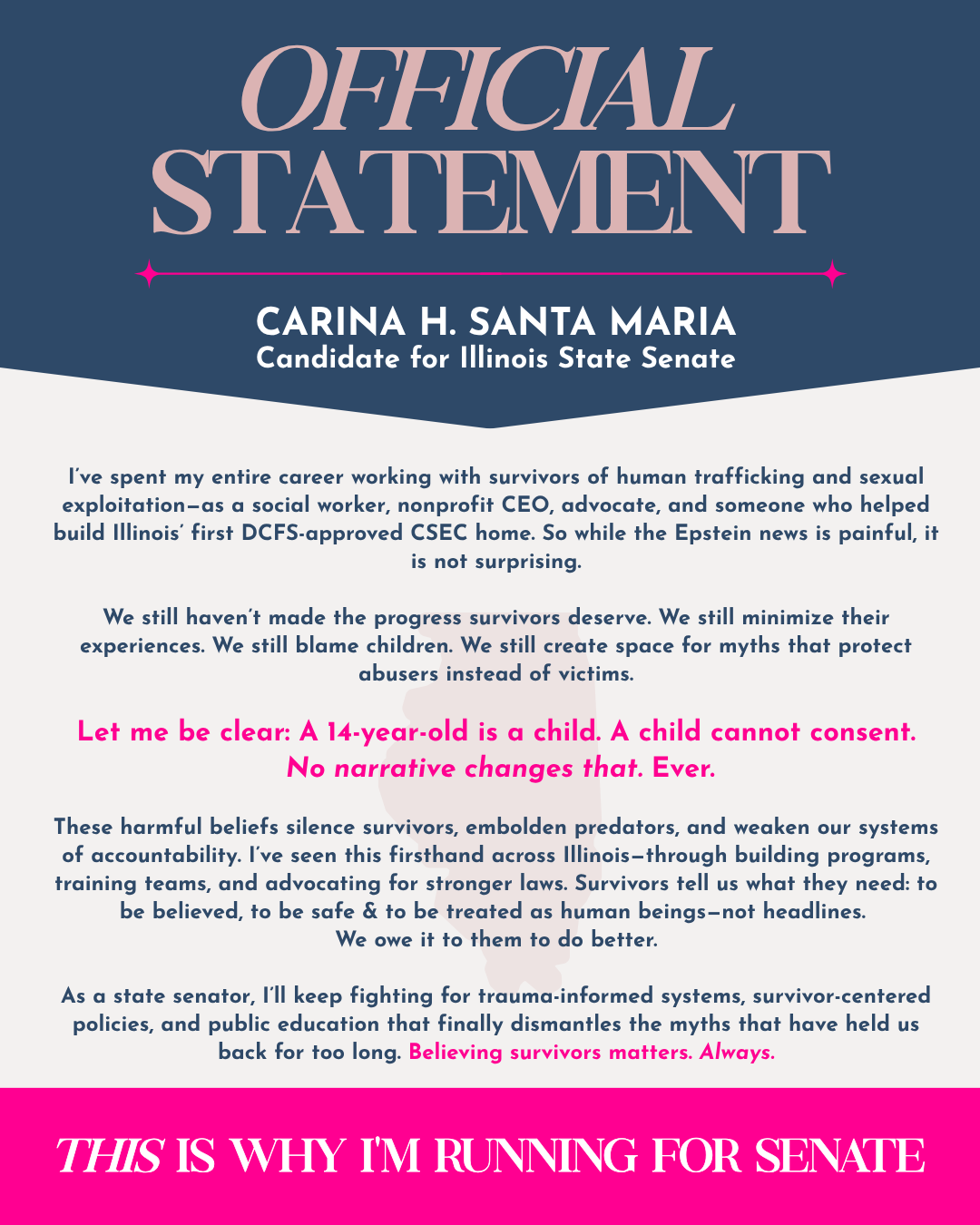We Are Failing Survivors: What the Epstein Case Reveals About Our National Blind Spot
In the past few weeks, the news surrounding the Epstein case has reopened wounds that survivors of sexual exploitation have carried for decades. For many people, the revelations feel shocking. For those of us who have worked with survivors our entire careers, they feel painfully familiar.
I have spent my professional life working in the field of child welfare, human trafficking, and sexual exploitation—building programs, shaping policy, training staff, supporting victims, and helping create the first DCFS-approved CSEC (Commercial Sexual Exploitation of Children) home in Illinois. I have written dissertations on this work, advocated for legislation, and sat with survivors as they navigated trauma most of us cannot imagine.
And yet, what we are seeing today tells me something heartbreaking:
As a society, we have made far too little progress in understanding victims of sexual abuse and trafficking.
When We Talk About 14-Year-Olds as Though They Can Consent, We Show Exactly Where We Are
One of the most disturbing elements of the current public discourse is the language being used to describe children who were abused. Phrases like:
“But they were 14…”
“They knew what they were doing…”
“They went back…”
This language is not just misguided—it’s dangerous.
Let me be unequivocally clear:
A 14-year-old is a child.
A child cannot legally consent to sex with an adult.
Not in Illinois. Not anywhere. Not ever.
When we blur that line, even subtly, we participate in the very culture that allows exploitation to thrive.
Victims Are Not Criminals—Yet They Are Treated As Such
In my work, I have watched survivors be scrutinized and criminalized more harshly than the people who harmed them. Systems often ask:
“Why didn’t you run?”
“Why did you trust him?”
“Why didn’t you tell someone sooner?”
But we rarely ask:
Why did an adult exploit a child to begin with?
Why did systems fail to protect them?
Why do some perpetrators avoid accountability for years—sometimes forever?
We still, too often, hold victims to a standard of behavior that ignores trauma, grooming, fear, and survival.
Compliance Is Not Consent — It Is Survival
Trafficking rarely looks like what you see in movies.
It does not always involve kidnapping or force.
It often involves:
Grooming
Manipulation
Promises of opportunity
Threats
Emotional control
Economic dependence
When a young person appears “compliant,” that does not make them complicit.
It means they were trying to survive.
Systems Must Change — But So Must Our Language
I have been part of writing legislation and building programs, and I can tell you: policy can only go so far when our culture still stigmatizes survivors.
We must retire language that blames victims and start using terms that reflect the truth.
Words shape perception. Perception shapes policy. Policy shapes lives.
If we want to prevent another generation of children from being harmed the way Epstein’s victims were, we must start by believing them, supporting them, and refusing to criminalize their trauma.
What Leaders Must Do Next
Here’s what real leadership looks like:
Center survivors—not institutions. Their voices should guide our policy and practice.
Strengthen trauma-informed systems. From police response to courtroom procedures to service providers—every stage must reflect an understanding of trauma.
Expand safe housing and specialized services. Survivors need stability, not judgment. The CSEC home we built in Illinois is just the beginning.
Hold offenders accountable—regardless of wealth or power. Justice cannot be selective.
Educate the public. Misunderstanding fuels exploitation. Knowledge disrupts it.
Why This Matters for Illinois
Illinois has been a leader in anti-trafficking work — but leadership requires constant vigilance. We cannot rely on old laws and assume progress is permanent. As this moment shows, societal attitudes remain one of the largest barriers to justice.
If elected to the Illinois State Senate, I will continue the work I’ve done my entire career:
Strengthening protections for survivors
Advocating for trauma-informed policy
Expanding specialized housing
Ensuring our systems do not retraumatize the very people they were created to protect
And fighting for accountability at every level
Because every child deserves safety, dignity, and the chance to heal.
We Must Do Better — And We Can
The Epstein case is not just a story of one man’s crimes.
It is a story of cultural blind spots, institutional failures, and the persistent dehumanization of victims.
But it is also an opportunity—a mandate, really—to change course.
We owe that to survivors.
We owe that to our communities.
We owe that to our children.
And we cannot wait another decade to get this right
Thank you for your support, your trust, and your belief in what we can build together.
Let’s keep going—because together, we’re stronger.
With gratitude,
Carina Santa Maria
Candidate for Illinois State Senate, District 27

